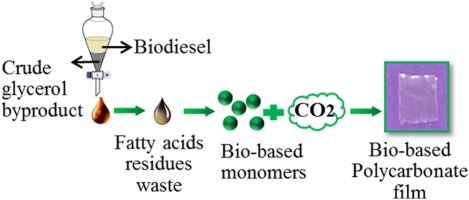Journal of CO2 Utilization ( IF 7.2 ) Pub Date : 2019-06-15 , DOI: 10.1016/j.jcou.2019.06.004 Shaoqing Cui , Joshua Borgemenke , Zhe Liu , Harold M. Keener , Yebo Li

|
An innovative and sustainable conversion to produce bio-based polycarbonates from carbon dioxide (CO2) and crude glycerol-fatty acids waste were developed. Crude glycerol, the byproduct of industrial biodiesel process, mainly composed of fatty acids, glycerol, and impurities. Bio-based Epoxide monomers were successfully produced from fatty acids residues waste from crude glycerol refining process with bio-based ephichlorohydrin derived from refined crude glycerol donating epoxy group. Bio-based polycarbonates were successfully synthesized through copolymerizing CO2 and obtained bio-based epoxide monomers, giving carbonate linkages of 98.1%. The effects of impurities from raw crude glycerol on the properties of obtained bio-based polycarbonates were found to be trivial. The bio-based polycarbonates plastic film exhibited good transparency, stable thermal property (thermal decomposition at ˜230 °C), and good mechanical properties (tensile strength of 1.69 MPa, elongation of 59.6%). This developed innovative conversion may provide a new platform to convert CO2 and industrial residues wastes to biodegradable bio-based plastics, affording solutions for environmental challenges.
中文翻译:

从CO 2和基于生物柴油的粗甘油废料向基于生物的聚碳酸酯进行创新的可持续转化
开发了一种创新的,可持续的转化方式,可以利用二氧化碳(CO 2)和粗甘油脂肪酸废料生产生物基聚碳酸酯。粗甘油,是工业生物柴油工艺的副产品,主要由脂肪酸,甘油和杂质组成。从粗甘油精制过程中的脂肪酸残渣与精制粗甘油的环氧基团衍生得到的生物基环氧氯丙烷成功地生产了生物基环氧单体。通过共聚CO 2成功合成了生物基聚碳酸酯并获得生物基环氧化物单体,碳酸酯键为98.1%。发现来自粗制粗甘油的杂质对获得的生物基聚碳酸酯的性能的影响很小。该生物基聚碳酸酯塑料膜表现出良好的透明性,稳定的热性能(在约230℃下的热分解)和良好的机械性能(抗张强度为1.69MPa,伸长率为59.6%)。这项开发出的创新性转换技术可能会提供一个将CO 2和工业残余废物转换为可生物降解的生物基塑料的新平台,从而为环境挑战提供解决方案。





















































 京公网安备 11010802027423号
京公网安备 11010802027423号